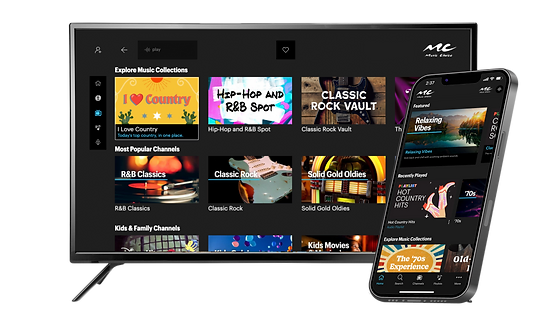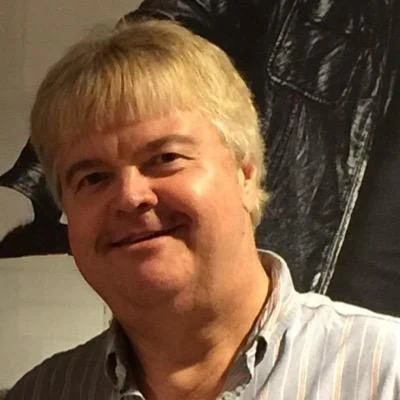Barrett Media produces daily content on the music, news, and sports media industries. To stay updated, sign up for our newsletters and get the latest information delivered straight to your inbox.
Jim Murphy is the Director of Programming for Music Choice and Country Programming. In addition to Country, Murphy is responsible for the Music Choice oldies channels, including the 70s channel, Malt Shop, and others.
Next year, Murphy will celebrate 50 years in radio, including stops in Boston, Denver, Jones Radio Networks, and Dial Global.
Murphy says that programming for Music Choice has more similarities than differences to terrestrial radio.
“This is linear audio, in that you’re playing a stream of music, and whether this goes out through a terrestrial AM or FM transmitter, or whether it goes out through the cable, in the case of Music Choice, there’s a Program Director who selects the songs, who determines the order that they’re going to play, figures out which ones are the most popular, and plays those more, and ones that are not quite as popular, plays those less, and does it in a way so that everyone who’s listening to that broadcast is hearing the same thing at the same time, said Murphy.”
“So that makes it different from streaming, because in streaming people can start and stop wherever they like, they can back up, they can skip over songs, but we’re much more like radio, in that you turn it on, you listen for as long as you care to, and you’re going to hear the same song as the person in the next town. When you’re listening to Music Choice in Las Vegas, or in Nashville, or in Portland, Maine, you’re hearing exactly the same songs at the very same time, and we do this across seven time zones.”
When programming across seven time zones, what happens to any regional flavor?
Murphy said, “We don’t have really a regional flavor, and I learned this, working at several different networks, starting with ABC, back in the early 90s, when I was working with Buck Owens and programming Real Country for him, and then later working for Jones Radio Networks and GAC. What you want to find is that common thread. You want to find those things that are universal, that you hope are going to work in every part of the country.”
“I have great respect for those programmers who are in Tampa, or Dallas, or in Bakersfield, who say, this act works for me, this song works for me, and maybe nobody else in any other part of the country gets that,” said Murphy. “I, on the other hand, need to be looking for those things that will work in Bakersfield, and in Dallas, and Tampa, hopefully more or less equally well.”
While terrestrial radio has a fairly short listening time, Murphy says Music Choice listeners spend more time when they engage.
“It’s much longer for all of the reasons that you might expect. It is an at-home experience so when people put it on, they’re going to be at home for probably a longer period of time. The dashboard experience, which is where most of terrestrial radio’s listening is done anymore, has gotten shorter, and a lot of that has also been impacted by the pandemic.”
“People are not going into the office as often as they used to; therefore, they’re not in their car as often as they used to be. Work patterns have changed. There have been a lot of things that have influenced how people listen to terrestrial radio, but a lot of that revolves around the in-car usage.”
Longer time spent listening means a different approach to music rotations.
“We don’t play; we can’t play songs as often; we don’t have the same kinds of minimal artist separations on Music Choice that terrestrial radio has because if your average occasion is 15 minutes, you’re going to program differently than if your average occasion is an hour, an hour and a half, or two hours.
Murphy and Music Choice are known in the industry as champions of new Country music and young up and coming artists.
“I am so fortunate that as a programmer for Music Choice, we and I’m talking about the entire programming team, are challenged to look for the next thing, to look for artists that we think are going to be trendsetters, people who are going to resonate with our audience, and there is no reason for us to be conservative in that way.”
“Being in Nashville, I’m exposed to it every day, every night, and you, having been here, know just how much of a music town this is. I mean, you could be doing three different shows every night if you had the stamina to do that. If I am able to see an act, listen to an act, meet the act, and then say, yes, this is someone who we think we would like to invest in, that we would like to support, that we would like to be on the front lines for.”
When Murphy commits to an add it is not for two or three spins a week. On the Country side he has a category that allows the song to be highlighted. And unlike terrestrial stations that may start a song overnight there is no such thing as overnights for Music Choice.
“We give that song extra exposure in what we call our brand new category. Like all of our categories, from the lightest to the heaviest, there is no day partying on our Music Choice Country channels. When you are in seven time zones, there really is no such thing as a day part. Because what is overnight, in one part of the country is morning drive in another. So, we play the song in equal rotation in all-day parts. And I think if anything says to an act, we support you, we’re going to expose this throughout our entire day. That philosophy really encapsulates that.”
Prior to the pandemic Music Choice captured a lot of videos and content in its Manhattan studios, and something that also changed with the pandemic.
“What we’re doing now is pretty much what happened before the pandemic, which was we had three television studios in our Midtown Manhattan office. We had video editors and camera people and lighting and sound and all of that.”
“When the pandemic hit, no one was traveling. Artists wouldn’t come out; it is completely understandable. So that had to go away and what replaced it ultimately was artists deciding, you know what? I’m going to put a green screen in my house, our label saying, we’re going to build a small studio inside of our label headquarters. And they began self-shooting this content. So, we might, at the end of the day, have more content now than we had when we were shooting in New York.”
“The difference being that it’s coming directly from the artists as opposed to them having to fly up with their team and a glam squad and everything else. It’s really, at the end of the day, more efficient, and we get everything that we need. And I think that the artists get more exposure out of it because of it.”
Murphy sees Country music changing and embraces what comes next.
“Having done this now for nearly 50 years, it’ll be 50 years in 2025. What I tell them is, Country music has changed, it is changing, it will always change, because that’s what a vital, dynamic art form always does.”
“Pop music is not the same today as it was five, 10, 15, 20 years ago. And I don’t expect Country music to be, although certainly there are those people who think that it should be what they grew up on, which, depending on your age, could be music from the 90s or the 2000s.”
“But it’s always going to change. And I am excited for what’s coming next, because the superstars of tomorrow, we may not have even heard yet, but they’re right around the corner. And that’s what keeps me, having done this for so long, interested in this.”
“I love programming our Classic Country Channel. That’s my personal favorite. It also has one of our highest times spent listening on Music Choice. And it’s great to hear those songs in the 50s and the 60s and the 70s.”
“And yet, at the same time, the songs that someday will be on the Classic Country Channel are songs that we’re playing right now. Artists that are just now in development, will be the next superstar. So that keeps me interested and excited and really bullish on Country.”
Check Out Music Choice here.


Jeff Lynn serves as Editor of Barrett Media’s Music Radio coverage. Prior to joining Barrett Media, Jeff spent time programming in Milwaukee, Omaha, Cleveland, Des Moines, and Madison for multiple radio groups, including iHeartMedia, Townsquare Media, NRG Media, and Entercom (now Audacy). He also worked as a Country Format Editor for All Access until the outlet shut down in August 2023.
To get in touch with Jeff by email, reach him at Jeff@BarrettMedia.com.



